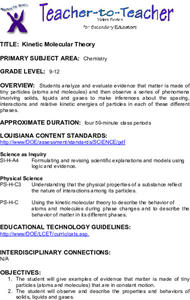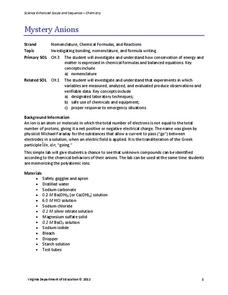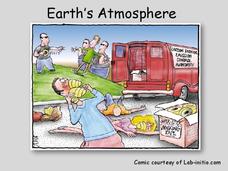Curated OER
World of Plastics and Polymers
Learners investigate plastics and learn they are giant molecules made of carbon atoms. In this polymers and plastics lesson, students perform 3 activities which all include making polymers from household items such as milk and vinegar,...
Curated OER
The Chemistry of Life
After studying the different aspects of atoms and their reactivity, pupils will find this summary PowerPoint useful for review. Some of the slides are informative with labeled diagrams; others give important vocabulary. Teachers may want...
Curated OER
Chemical Equations and Reactions
Graphic organizers, photos, diagrams, and text bring the world of chemical reactions to life. By viewing this presentation, young chemists learn how to recognize when a chemical reaction has occurred, and how to balance chemical...
Curated OER
Predicting Molecular Shapes
In this molecular shapes worksheet, learners read about how to predict molecular shapes in molecules based on the number of electron pairs and the VSEPR theory. Students are given twelve molecules, they draw the Lewis structures and...
Curated OER
Kinetic Molecular Theory
High schoolers analyze and evaluate evidence that matter is made of tiny particles. They observe a series of phenomena involving solids, liquids, and gases to make inferences about the spacing, interactions and relative kinetic energies...
Curated OER
Using the Carbon Cycle Interactive Game in the Classroom
An online reading and interactive game bring the path of a carbon molecule to life for your earth science explorers! As an assessment, learners can map out or write about their experience in the carbon cycle. Thoroughly written...
American Chemical Society
Air, It's Really There
Love is in the air? Wrong — nitrogen, oxygen, and carbon dioxide are in the air. The final lesson in the series of five covers the impact of temperature on gases. Scholars view a demonstration of gas as a type of matter before performing...
Science Geek
Stoichiometry
Watch your class react when you tell them they're going to study stoichiometry! The lesson demonstrates four examples. Scholars must write and balance the chemical equation and then make the conversion to find the correct mass or volume....
Virginia Department of Education
Mystery Anions
Lost an electron? You should keep an ion them. Young chemists learn qualitative analysis in the second lesson of an 11-part chemistry series. After observing reactions of simple salts, the teacher provides pupils with unknown...
Teach Engineering
Engineering and the Periodic Table
Elements, to the rescue! Scholars first review the periodic table, and then learn about the first 20 elements and their properties and uses in the fourth of six lessons in the Mixtures and Solutions unit. Applying their newfound...
Virginia Department of Education
Finding the Formula and Percent Composition
Do you have mole problems? If so, call Avogadro at 602-2140. The lesson starts with pupils working independently to solve for molar mass of ionic compounds. Then they learn to solve for percent composition and later perform an...
National Institute of Open Schooling
Solid State
Crystal comes from a Greek word meaning ice. Activity eight in a series of 36 has class members analyzing amorphous and crystalline solids and further classifying them based on their forces. They then explore solids, learning about unit...
Concord Consortium
Temperature and Reaction Rate
Does increasing temperature increase the rate of a chemical reaction? Junior chemists examine the effects of temperature on reaction rate using an engaging interactive. Pupils select the temperature of the reaction vessel, then observe...
American Chemical Society
Different Substances React Differently
Looks don't tell the whole story. Young experimenters explore reactions with substances that look similar. They observe the reactions that take place when combined with baking soda and use indicators to conclude they react differently...
Curated OER
Models of Hydrocarbons
Students construct models of hydrocarbon molecules using candy and toothpicks. In this hydrocarbons lesson plan, students are given a sheet with the molecular formulas of hydrocarbons. As a group, they construct each molecule using...
Curated OER
Putting the Ice in Hockey
Eighth grade physical science classes examine why the ice on which hockey is played is slippery. They do so by discussing phases of matter and the molecular motion in each. They read an article on a website and write out answers to...
Curated OER
Polymers
Young scholars explore online tutorial on polymers. In this chemistry lesson, they create two polymers in the lab and compare their properties. They write a sales letter about their new and improved polymer product.
Curated OER
The Physical Setting
Tenth graders examine chemical reactions. In this chemistry lesson students choose an investigation that they wish to perform based on their interest.
Curated OER
Climate & Atmosphere: A Global & Local Perspective
Students complete a series of activities in which they study atoms, molecules, and the presence of atmosphere. They study the water cycle and the Greenhouse Effect by investigating and completing handouts.
American Chemical Society
Heat, Temperature, and Conduction
How does heat move from one item to another, even when the items are in different states of matter? Pupils experiment with adding washers to hot water and adding hot washers to room temperature water to observe the heat transfer.
University of Georgia
Endothermic and Exothermic Reactions
Equip your chemistry class with the tools to properly understand endothermic and exothermic reactions. Young chemists collect, analyze, and graph data to determine how the Law of Conservation of Matter is applied to chemical...
Chymist
Esters: An Introduction to Organic Chemistry Reactions
Scratch and sniff an introduction to organic chemical reactions. A creative lesson has individuals study the esters commonly used in scratch-and-sniff stickers and advertisements. Following the lab procedure, scholars create the organic...
Curated OER
Chemistry of Carbon: Building Blocks of Life
After giving basic details about the properties of Carbon, some of the common functional groups and molecules are featured. There are some details about specific functions and impact on the human body. The diagrams are helpful and could...
Science Geek
Earth's Atmosphere
Ozone gas absorbs the harmful UV-B rays and helps protect humans. An informative presentation begins with the layers of the earth's atmosphere, the pressure and temperature in each of the layers, the ozone layer, the ozone cycle,...

























